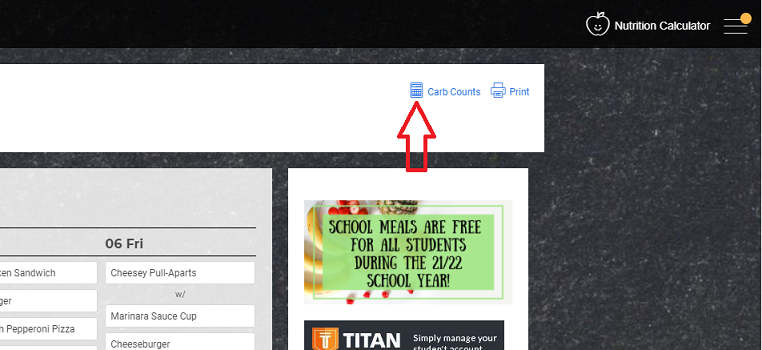Food Service
"Serving, Nurturing, and Nourishing Our Children"
We are proud to provide quality, nutritious meals to students during the school day. This is accomplished by participating in several child nutrition programs that are designed to support students’ nutritional needs. The primary purpose of these programs is to provide balanced school meals and snacks to students each school day.
Amphitheater Food Service Department serves over 10,000 healthy meals each day!
Meal account:
Need to add money to your child's meal account? Please go to the Parent Portal on Infinite Campus and click the "Food Service" link in the left-side navigation. If you haven't signed up for the Portal, please contact your school's front office. You will need a link specific to your child to get started.
More information:
Contact the Amphi Food Service Main Line: 520-269-4773; email: amphifoodservice@amphi.com
In accordance with federal civil rights law and USDA civil rights regulations and policies, the USDA, its agencies, offices, employees, and institutions participating in or administering USDA programs are prohibited from discriminating based on race, color, national origin, religion, sex, disability, age, marital status, family/parental status, income derived from a public assistance program, political beliefs, or reprisal or retaliation for prior civil rights activity, in any program or activity conducted or funded by USDA (not all bases apply to all programs). Remedies and complaint-filing deadlines vary by program or incident.
Persons with disabilities who require alternative means of communication for program information (e.g., Braille, large print, audiotape, American Sign Language, etc.) should contact the state or local agency that administers the program or contact USDA through the Telecommunications Relay Service at 711 (voice and TTY). Additionally, program information may be made available in languages other than English.
To file a program discrimination complaint, complete the USDA Program Discrimination Complaint Form, AD-3027, found online at How to File a Program Discrimination Complaint and at any USDA office or write a letter addressed to USDA and provide in the letter all of the information requested in the form. To request a copy of the complaint form, call (866) 632-9992. Submit your completed form or letter to USDA by:
- Mail: U.S. Department of Agriculture, Office of the Assistant Secretary for Civil Rights, 1400 Independence Avenue, SW, Mail Stop 9410, Washington, D.C. 20250-9410;
- Fax: (202) 690-7442; or
- Email: program.intake@usda.gov.
USDA is an equal opportunity provider, employer, and lender.
De acuerdo con la ley federal de derechos civiles y las políticas y regulaciones de derechos civiles del USDA, el USDA, sus agencias, oficinas, empleados e instituciones que participan o administran programas del USDA tienen prohibido discriminar por motivos de raza, color, origen nacional, religión, sexo, discapacidad, edad, estado civil, estado familiar o de parental, ingresos derivados de un programa de asistencia pública, creencias políticas o represalias por actividad previa de derechos civiles, en cualquier programa o actividad conducido o financiado por el USDA (no todas las bases se aplican a todos los programas). Los recursos y los plazos para presentar quejas varían según el programa o incidente.
Las personas con discapacidades que requieren medios alternativos de comunicación para obtener información del programa (por ejemplo, braille, letra grande, cinta de audio, lenguaje de señas americano, etc.) deben comunicarse con la agencia estatal o local que administra el programa o comunicarse con el USDA a través del Servicio de Retransmisión de Telecomunicaciones al 711 (voz y TTY). Además, la información del programa puede estar disponible en otros idiomas además del inglés.
Para presentar una queja por discriminación en un programa, complete el Formulario de queja de discriminación de programas del USDA, AD-3027 , que se encuentra en línea en Cómo presentar una queja de discriminación de programas y en cualquier oficina del USDA o escriba una carta dirigida al USDA y proporcione en la carta toda la información solicitada en el formulario. Para solicitar una copia del formulario de queja, llame al (866) 632-9992. Envíe su formulario completo o carta al USDA por: Correo: U.S. Department of Agriculture, Office of the Assistant Secretary for Civil Rights, 1400 Independence Avenue, SW, Mail Stop 9410, Washington, D.C. 20250-9410; Fax: (202) 690-7442; o
Correo electrónico: program.intake@usda.gov.
El USDA es un proveedor, empleador y prestamista que ofrece igualdad de oportunidades.
More Information
-
-

*For Carb Count information, please click the image above to visit the new menus page. Carb Count information will be on the right hand side of the page. Once a school and menu is selected, click on the calculator icon*

Some Amphi schools participate in the Breakfast in the Classroom program. Breakfast is the most important meal of the day! Skipping it has both short and long term effects. It can make a child restless, tired, and inattentive. It can also contribute to tardiness, poor attendance, and overall lower grade performance. By serving Breakfast in the Classroom, students are ensured a balanced and nutritous meal needed to think clearly, concentrate on learning, and perform better in class.
Schools that participate in the Breakfast in the Classroom program include: Holaway Elementary, Keeling Elementary, Nash Elementary, Prince Elementary, Rio Vista Elementary, Amphi Middle School, Rillito Center, and Amphi High School.
We strive to provide the most accurate information, however, nutritional content of menu items may vary due to variations in recipes, product and seasonal availability, and or substitutions. Some calculations reflect averages of available flavors. Additionally, all of our sites participate in an offer vs. serve program which allows students to select from the items offered and are not requred to take all items. Carbohydrate counts are listed for all items offered. School Health Professionals may utilize the Carbohydrate counts as a reference, however, it is the responsibility of the school health professional and/or parents to check the Special Medical Diet Order on file for plan specifics. In addition, individuals should double check the portion sizes relative to the menu being served and to verify the Carbohydrate counts based on the students portions. If you have any questions regarding the menu, special diet accommodations and/or carbohydrate counts, please contact the Food Service Nutritionist.
Food Service Nutritionist
Contact Info:
Betsy Clark, Menu Planner
Amphitheater School District
520-696-3715
-
Please click a link below to learn more about guidelines for special diets and to find the form to submit for your child’s dietary needs.
Special Diet Information and Form (English)
Special Diet Information and Form (Spanish)
-
Food Service Programs Include:
School Breakfast Program
Breakfast in the Classrom (BIC)

National School Lunch Program

Summer Food Service Program

Before and After School Child Care Snack Programs
Alphabest Before & After School Care

Faculty Food Services
Special Event Catering
-
-
-
